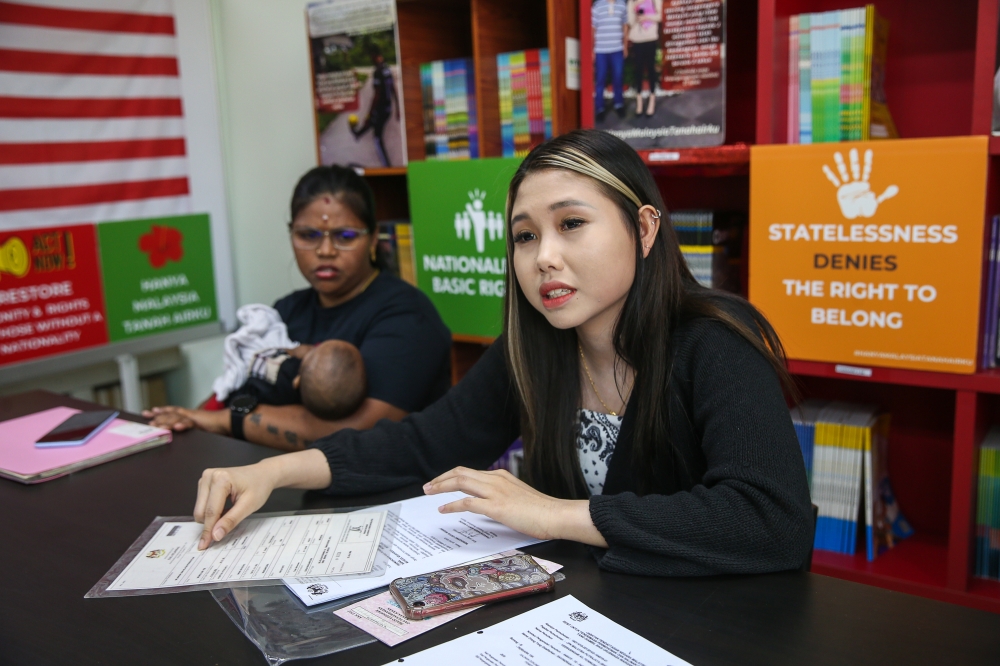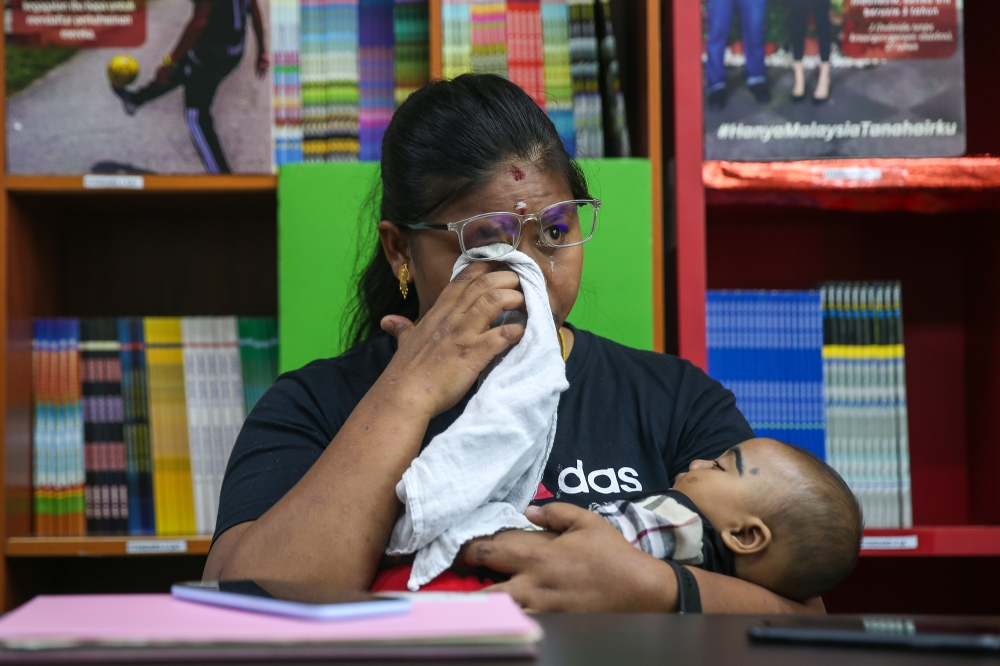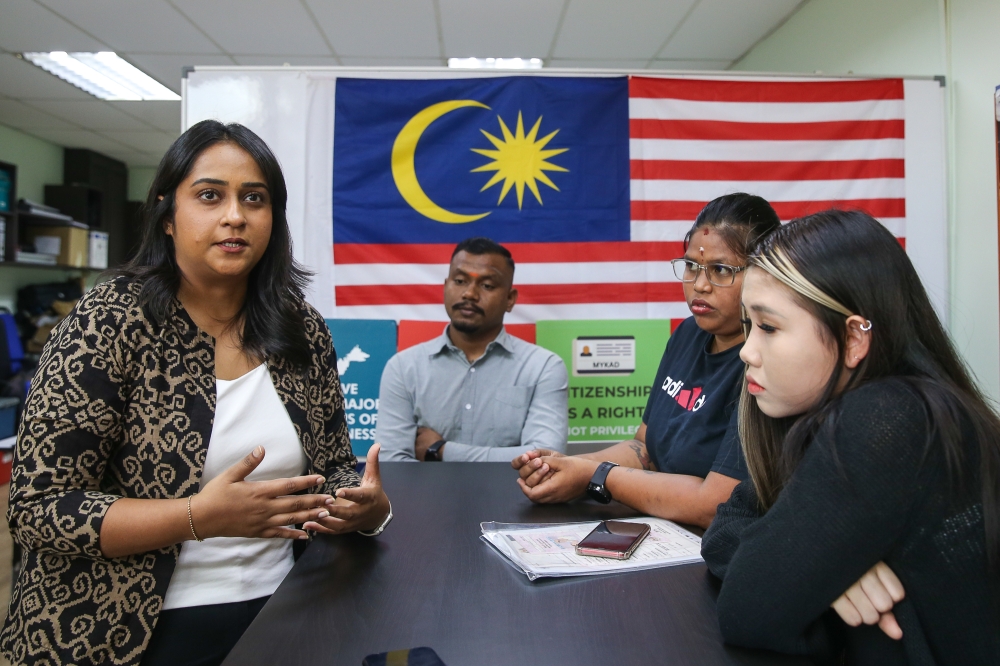- Several Malaysian-born stateless persons related how they have suffered from their status: from missing examinations in schools, rejected from civil service posts, and finding it difficult to get jobs.
- An amendment Bill, which lowers the age limit for citizenship applications from 21 to 18 years, threatens to leave thousands of stateless individuals without a clear path to citizenship.
- The government is urged to create a clear pathway for stateless individuals over 18 years old, as the Bill could exacerbate the already dire situation for many stateless people.
KUALA LUMPUR, Sept 7 — Wong Kar Yee, 21, said she never knew she was not a Malaysian citizen until she was in Form Three.
Without an identification card (IC) to say that she is a Malaysian, she could not sit for the now-abolished PT3 examinations. So she quit going to school.
“Now, my child is also stateless because my Malaysian partner and I could not register our marriage,” Wong, who works in the packaging sector at a warehouse, told Malay Mail in a recent interview.
Wong said she was initially issued a birth certificate that legally recognised her as a Malaysian citizen.
However, when she turned 12, the National Registration Department (NRD) denied her a blue IC since she was born out of wedlock to her Malaysian father and Indonesian mother — who abandoned them when Wong was three years old.
Her father was told to let go of her wrongly-issued birth certificate in exchange for a red birth certificate given to non-citizens.
This would have enabled her to pursue her Malaysian citizenship through Article 15A of the Federal Constitution — which grants special powers to the federal government to register anyone below 21 years old as citizens, as it thinks fit.
However, Wong’s father refused to do so.

“My father might be wrong but the government must consider my fate and my child’s,” she said.
But now when Wong is seeking to overturn her father’s decision, the government instead is pushing for a citizenship amendment Bill which would lower the age limit for applicants under Article 15A from 21 to 18 years old.
If this Bill is passed, Wong will forever be rendered stateless. So will her three-year-old toddler.
What does the Constitution say?
Article 15A
Subject to Article 18, the Federal Government may, in such special circumstances as it thinks fit, cause any person under the age of twenty-one years to be registered as a citizen.
Article 18(1)No person of or over the age of eighteen years shall be registered as a citizen under this Constitution until he has taken the oath set out in the First Schedule.
Article 19(1)
Subject to Clause (9), the Federal Government may, upon application made by any person of or over the age of twenty-one years who is not a citizen, grant a certificate of naturalisation to that person if satisfied — (a) that he has resided in the Federation for the required periods and intends, if the certificate is granted, to do so permanently;(b) that he is of good character; and(c) that he has an adequate knowledge of the Malay language.
Article 19(2)
Subject to Clause (9), the Federal Government may, in such special circumstances as it thinks fit, upon application made by any person of or over the age of twenty-one years who is not a citizen, grant a certificate of naturalisation to that person if satisfied — (a) that he has resided in the Federation for the required periods and intends, if the certificate is granted, to do so permanently;(b) that he is of good character; and(c) that he has an adequate knowledge of the Malay language.
Bleak future for their next generation
Meanwhile, all 28-year-old Ravindran Veerasingam wanted was to be a police officer, or a firefighter. Since he was not recognised as a citizen, this was a dead end.
“I also struggled to get jobs at banks and hospitals. I’m afraid to get married without my citizenship because my children will suffer the same fate,” Ravindran, who works as a cargo handler said.
Ravindran holds a red IC with permanent resident status after he was adopted from an orphanage. With it, he managed to complete the Sijil Pelajaran Malaysia (SPM) examinations.
He is now attempting to apply for citizenship through naturalisation via Article 19(1) of the Constitution, after failing once when trying via Article 15A.
He had applied back in 2012 and his application was rejected in 2013. However, Ravindran only knew that his application was rejected this year — a whopping 12 years after.

The situation is far more depressing for Kathrina Arjunan, 26, who could not sit for SPM since her school refused to issue her student confirmation letter because of her non-citizen status.
Born to a Malaysian father and a Filipino mother who later disappeared without a trace, Kathrina and her older brother were adopted by their biological father once he legally remarried a Malaysian woman.
Fortunately, her adoption certificate allowed her to legally register her marriage with her Malaysian husband, granting both her children citizenship.
“However, as a stateless person, I cannot get jobs and support my husband financially to raise my children,” she said.
Similarly, Wong Chun Siang waited nearly eight years before his citizenship bid through Article 15A was dismissed when he turned 21 in 2013.
Unlike Ravindran, Wong failed to get a red IC despite being legally adopted by a Malaysian couple who were his biological father’s friends.
However, he managed to obtain a green IC (temporary resident status) after applying for it in July 2022.

Which ways are left for them?
Maalini Ramalo, the director of social protection at the Development of Human Resources for Rural Areas (DHRRA) said that the only remaining citizenship pathway for cases like Kathrina and Wong is Article 19(2) of the Federal Constitution.
“Article 19(1), however, is only available for permanent residents with a red IC,” Maalini explained.
“Those without a red IC can only opt for the lesser-known Article 19(2), where the government can grant citizenship by naturalisation, in special circumstances as it sees fit.”
As thousands of stateless cases remain unresolved within 21 years, Maalini said more stateless people will be left out if the government lowers the age ceiling under Article 15A to 18 years old.
“If the government still insists on amending the provision, then they should set up a clear pathway for citizenship for those aged 18 and above with a maximum waiting period of two years,” she said.
The Constitution (Amendment) Bill 2024 was tabled for the first reading at the Dewan Rakyat on March 25 but the second reading, however, was postponed from July to October.
Some of the changes proposed in the Bill include:
- The requirement of adequate Malay language knowledge on a foreign woman married to a Malaysian as part of her citizenship application.
- Lowering the age limit of citizenship applications under Article 15A from 21 years old to 18.
- Granting automatic citizenship to children born abroad to Malaysian women with foreign spouses but not retroactively.
- Remove “permanent residents” from among those whose children would gain citizenship from birth in Malaysia and would instead require at least one parent to be Malaysian for them to be eligible.
- Foreign women who became Malaysian through marriage would have their citizenship revoked if their marriage were to be dissolved within two years of them gaining citizenship. The limit was previously two years from the date of marriage.



















